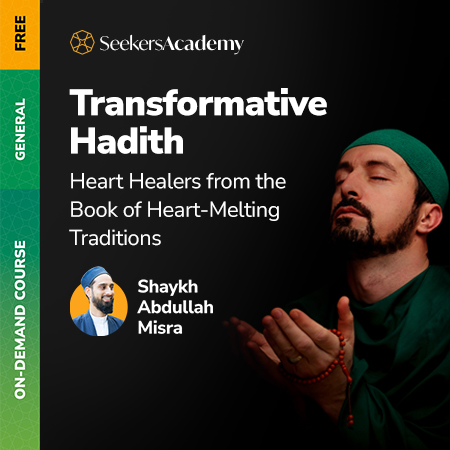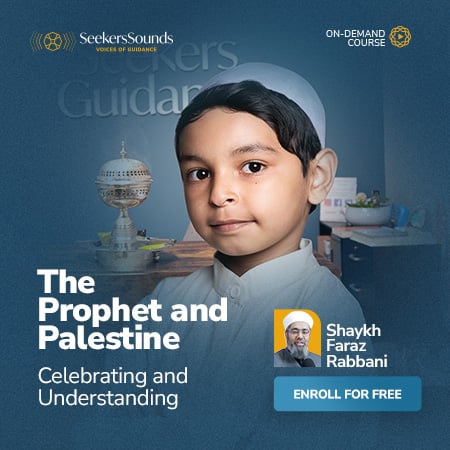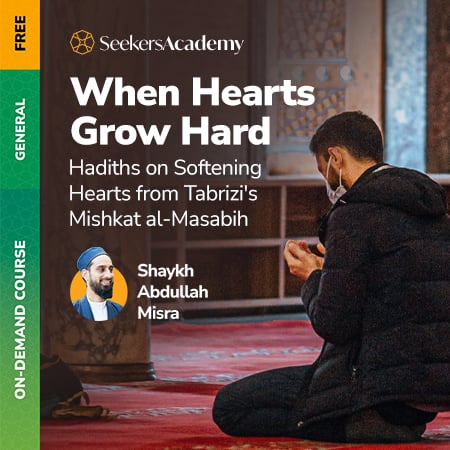
Shaykh Faraz Rabbani has explained the key meanings of this great poem—which has over 100 scholarly commentaries, due to its rich, deep, and beautiful meanings of faith and guidance.
- Teacher: Shaykh Faraz Rabbani
The Qasida Burda is a eulogy (praise poem) in honor of the Prophet Muhammad (peace and blessings be upon him). It consists of multiple stanzas that highlight the virtues, character, and noble qualities of the Prophet Muhammad (peace and blessings be upon him). The poem is structured in a form known as "qasida," which is a classical Arabic poetic style often used to praise or eulogize individuals.
The story behind the composition of the Qasidah Burda is quite well-known. According to tradition, Imam al-Busiri was afflicted with paralysis and suffered greatly. He composed this poem out of his deep love and longing for the Prophet Muhammad's (peace and blessings be upon him) intercession and help. Legend has it that the poet experienced a dream in which he presented the Prophet (peace and blessings be upon him) with a cloak (Burda), and the Prophet (peace and blessings be upon him) placed the cloak over him, resulting in his miraculous recovery.
The Qasida Burda has been immensely popular throughout the centuries and has been recited and memorized by Muslims all over the world. It has played a significant role in Islamic spirituality and has been regarded as a source of blessings and spiritual benefit. The poem is also often recited in various Islamic gatherings, especially those that celebrate the birth (Mawlid) of the Prophet Muhammad (peace and blessings be upon him).
The Qasida Burda is not just a literary work but also holds deep spiritual significance for many Muslims. It reflects the love and devotion Muslims have for the Prophet (peace and blessings be upon him) and serves as a means of expressing gratitude and seeking his blessings and intercession.
This course could benefit students pursuing Islamic studies at various levels, including university students and those attending Islamic seminaries. It could provide them with a deeper understanding of classical Islamic poetry and the spiritual significance of the Qasidah Burda
For those interested in exploring the historical, cultural, linguistic, and spiritual dimensions of the Qasidah Burda may find this course valuable for their pursuits.
Those who have a strong devotion to the Prophet Muhammad (pbuh) and a desire to learn more about his character and virtues, as celebrated in the Qasidah Burda, could benefit from this course.
Individuals with an interest in classical Arabic poetry and its symbolism may be drawn to a course on the Qasidah Burda, which is a masterpiece of Arabic literature.
Depending on the course's approach and level of content, it could also be open to a broader audience interested in expanding their knowledge of Islamic literature and spirituality.
- Develop a deep understanding of the themes, messages, and praise contained within the Qasidah Burda, with a focus on the virtues and qualities of the Prophet Muhammad (pbuh)
- Grasp the spiritual significance of the Qasidah Burda in the context of Islamic spirituality and devotion, and understand how it has been used as a means of expressing love and seeking blessings
- Learn about the various layers of interpretation and symbolism present in the Qasidah Burda, including the meanings behind metaphors and references used in the poem.
- Explore how the Qasidah Burda has been received and interpreted in various cultures and regions around the world.
- Develop a greater appreciation for the depth of devotion and love expressed toward the Prophet Muhammad (pbuh) in the Qasidah Burda.
- Gain an appreciation for the art of classical Arabic poetry, including its structure, rhyme, meter, and literary devices used in the Qasidah Burda.


